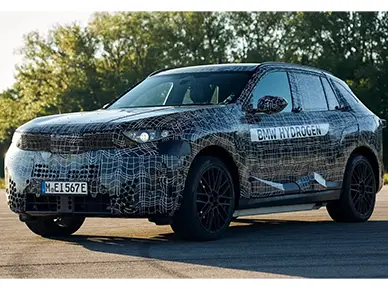
The German automotive giant BMW's colossal investments in the development of hydrogen power plants are beginning to bear fruit, as evidenced by the official confirmation of plans to launch full-fledged iX5 Hydrogen SUV production by 2028. This model will take its rightful place in the updated line-up of the next generation BMW X5, where it will sit alongside traditional petrol and diesel models, hybrid versions and classic electric cars, thus demonstrating a fundamentally new approach to the formation of an environmentally-oriented model range. The company's engineers are currently actively conducting road tests of improved prototypes based on the promising Neue Klasse platform, which will form the basis for the future iX3 and other key models of the Bavarian brand.
It should be noted that BMW specialists have been working on hydrogen technology for several years, and the current fuel cell system is already the third generation of development, created as a result of fruitful cooperation with the Japanese corporation Toyota, which has vast experience in this field. This close partnership has enabled German engineers to make significant progress in improving the efficiency and reliability of the power plant, which ultimately made it possible to decide on full-scale series production. Preparations for the industrial production of the iX5 Hydrogen have already begun at the company's specialised plant in Austria, where the necessary infrastructure will be deployed and modern equipment for large-scale assembly will be installed.
Official representatives of BMW, represented by Joachim Post, Member of the Board of Management for Development, emphasise the exceptional importance of hydrogen technology for the global process of decarbonising the transport system, especially in the context of developing next-generation urban mobility. According to the senior manager, the company considers hydrogen powertrains to be a strategically important area of its business, enabling it to offer consumers a truly carbon-free alternative to traditional internal combustion engines without the charging time and range limitations inherent in classic electric vehicles. In parallel with the development of the car itself, BMW is actively involved in expanding the network of hydrogen filling stations around the world as part of its own HyMoS initiative, which aims to create a comprehensive ecosystem for the everyday operation of fuel cell vehicles.
In terms of technical features, the iX5 Hydrogen will inherit all the key design features of the new generation of X5 models, while also receiving certain visual differences that emphasise its progressive powertrain. The hydrogen SUV is expected to offer consumers performance characteristics comparable to traditional versions, with a range of at least 500 kilometres on a single tank and a refuelling time of no more than five minutes, which is an undoubted advantage over battery electric vehicles. The cost of the production iX5 Hydrogen is still under discussion, but analysts predict that the price will be significantly higher than that of petrol and diesel counterparts, although comparable to top-of-the-range premium electric vehicles.

